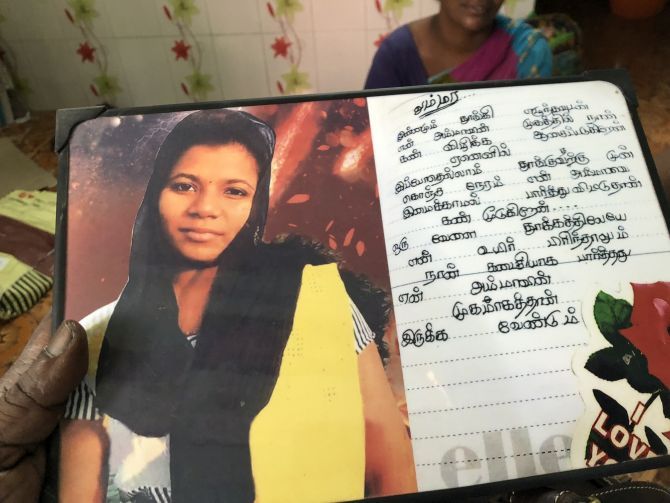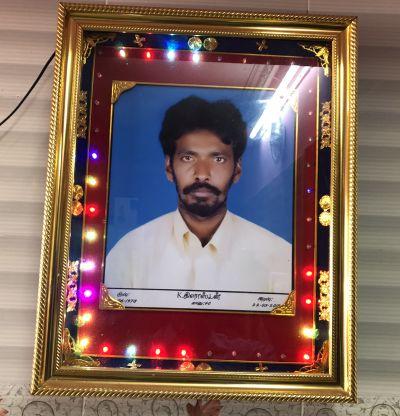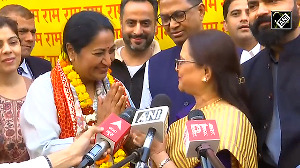A Ganesh Nadar/Rediff.com meets the families of those killed in the police firing on Sterlite protestors in Thoothukudi, and finds a similar tale running through their lives.

On October 10, Snowlin would have turned 20.
"She loved celebrating her birthday and every year she used to ask for something special," her mother Vanitha says with a sigh.
Snowlin, then 18, was among the thousands who marched towards the Thoothukudi district collectorate on May 22, 2018, to protest against the Sterlite plant when she was shot dead by a policeman in plainclothes -- the bullet piercing the back of her neck, damaging parts of her upper spinal cord and exiting through her mouth.
Nobody imagined there would be any violence that day -- so she joined the march with her mother, sister-in-law and her two infants.
For 99 days people from 19 villages around Sterlite Copper had sat in protest against the plant's planned expansion of its capacity. The government ignored the peaceful protest as the people had sat in their own villages.
On the 100th day the villagers announced that they would march to the collectorate to submit a petition against the expansion. But the administration had other ideas.
In all, 15 people died in the firing and many were seriously injured, but the government has persisted with its figure of 13 dead.
For parents Jackson and Vanitha, Snowlin, their youngest child, was their favourite. Of her two elder brothers, one works in the Middle East while the other has been given a job on compassionate grounds as a thalayari -- a village administrative officer's attendant. This, apart from the Rs 20 lakh the Tamil Nadu government gave as compensation.
Snowlin had completed her 12th standard and had planned to become a lawyer when fate struck through a bullet in the back.
Since her death "the media was here every day, then came the human rights people, we even attended the Aruna Jagadeesan one-judge inquiry commission and finally the CBI (Central Bureau of Investigation) came," Vanitha tells this correspondent at their home.
Her eyes mirror sorrow as she says, "October 10 was her birthday. She loved celebrating her birthday and every year she used to ask for something special. What can I give her this year? I don't even have tears to shed. I am just waiting to die so that I too can join her."
"The policeman who shot her must know he killed her. His conscience will kill him. I am not interested in punishing him. Whatever they do to him, will I get my child back?" the mother asks.
"We used to chat like friends and not like mother and daughter. One day she asked me, 'What will you do if I die?' I replied, 'I will cry, but you must remember that all of us are going to die, some sooner and the others later'."
Snowlin's mother then reads out parts from her diary filled with a teenager's powerful words.
'Even if you decorate my tomb with a thousand flowers it will not equal the tears you spill.'
To a friend she wrote, 'Will you shed a tear for me when I die?'
To her father, 'Please don't drink.'
There is a framed photograph of her with one of her poems in the house. The poem says, 'I wish to see my mother's face the first thing in the morning when I wake up. Every night before I sleep I always look at my mother. So even if I die in my sleep I will be happy that the last person I saw on earth was my mother.'

Jhansi, 47, was shot dead nowhere near the collectorate or the Sterlite plant. In Threspuram, a fisherman colony, she saw the police about to fire at a young boy. 'Why are you shooting this boy?' she screamed as the boy was known to her. Jhansi was shot instead; the boy survived.
P Jesu Balan, Jhansi's husband, says ruefully, "Our two girls, who are in Class 11 and 12, miss her the most. You don't know how difficult is to bring up girls without their mother."
Tending to his fishing nets, he says wryly of the government, "They gave me a cheque for Rs 20 lakh and their job is over."
Walking back home he speaks about the judicial inquiry, the flurry of activity by human right activists and finally the CBI probe.
"They spoke Hindi, but came with a Tamil translator," he says, and shrugs. "They say the case is on, but I have no idea."
 IMAGE: Glaston's framed photograph at his home.
IMAGE: Glaston's framed photograph at his home.Glaston, a fisherman, was shot dead at 40, leaving behind a young wife Jesurani and two children, a girl and a boy. Their son passed his Class 10 exam recently.
"They said when he is 19 they will give him a job. The collector said he has sent his papers to Chennai and is waiting for a reply," Jesurani says.
"My husband died at the collector's office gate, and since then I have met Judge Aruna Jagadeesan, human rights activists and the CBI, but nothing has happened. Rs 20 lakh and a government job, that's what his life is worth," she says with a sigh.
Manirajan had been married for only three months when he was shot dead. His wife received the Rs 20 lakh and a job at the tehsildar's office.
The story seems like part of a template with every victim. Rs 20 lakh ex-gratia and a government job per life snuffed out.











 © 2025
© 2025